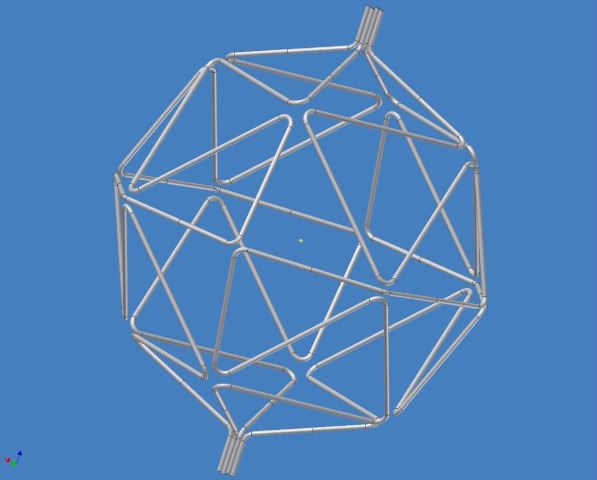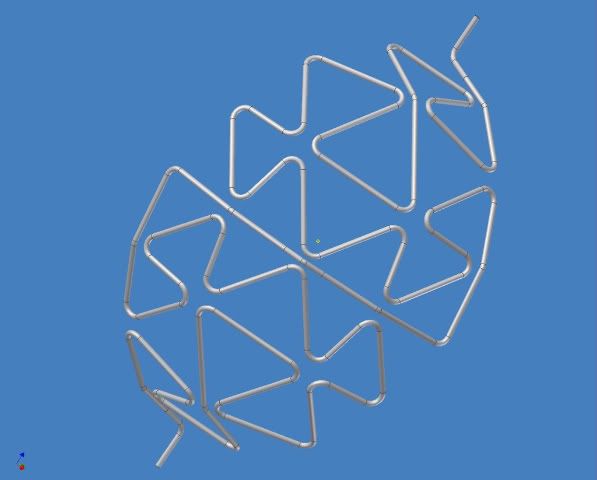Page 6 of 11
Posted: Thu Jan 07, 2010 1:14 am
by KitemanSA
Blaise,
The FAQ is BAQ! 
Posted: Sat Jan 16, 2010 2:35 am
by KitemanSA
Blaise, have you visited the FAQ yet? If so, what improvements do you suggest (I mean besides scrap it and start again!)?
Posted: Sat Feb 13, 2010 11:34 am
by vernes
blaisepascal wrote: BTW, The geometry Bussard wanted to use for the original WB-8 was the icosidodecahedron, which looks like this:

With 6 circuits you can wire it like the MPG devices.
http://demonstrations.wolfram.com/SixInterwovenLoops/
Posted: Sat Feb 13, 2010 12:36 pm
by KitemanSA
The problem with this 6 loop method is that there would be coil material in the center of every funny cusp which would lead to unacceptable electron losses.
By the bye, the MPG was NOT wired like this. It had a serpentine path around the volume but never once wove over/under like this.
I'd truly love to see that serpentine path!
Posted: Sun Feb 14, 2010 3:07 am
by vernes
KitemanSA wrote:By the bye, the MPG was NOT wired like this. It had a serpentine path around the volume but never once wove over/under like this.
True, But I saw some designs here involving multiple inlets.
KitemanSA wrote:I'd truly love to see that serpentine path!
Making one on a planar projection is easy. So easy I feel I'm missing something important.

What am I missing?
Posted: Sun Feb 14, 2010 4:56 am
by MSimon
What am I missing?
A uniform field.
It may not matter. I just thought I'd bring it up.
BTW it is going to be tricky to wire that up with superconductors.
Posted: Sun Feb 14, 2010 1:16 pm
by KitemanSA
vernes wrote: KitemanSA wrote:I'd truly love to see that serpentine path!
Making one on a planar projection is easy. So easy I feel I'm missing something important.

What am I missing?
Actually, I THINK that if one can mentally warp that into the proper 3D figure, that is exactly the desired path. Neat!
Can you do the same thing with the cuboctahedron projection? If so, maybe I can trace the 2D to 3D and confirm.
Tally-ho to the MPGI (MPG Icasododecahedron)!


Tombo, if you are still listening in, can you, would you PLEASE do a 3D projection of this path?
Expecially with bowed sides?
Thanks
Posted: Sun Feb 14, 2010 2:24 pm
by vernes
MSimon wrote:What am I missing?
A uniform field.
In layman's terms, some coils are made up from one segment, and some are made from two? Is that what prevents a uniform field?
KitemanSA wrote:Can you do the same thing with the cuboctahedron projection?
I'll try later today.
Posted: Sun Feb 14, 2010 6:28 pm
by vernes
Odd, the cuboctahedron IS the MPG design Bussard used.
as shown here:
http://ohiovr.com/polywell-faq/index.php?title=MPG
But anyway, here is the planar projection of it

Posted: Sun Feb 14, 2010 8:31 pm
by KitemanSA
Marvelous! Yes the MPG is the cuboctahedron.
Please note that your cuboc projection has about the same amount of linage on each wing. Is it easy for you to redo the icosadodec to have the same characteristic?
The reason I ask is that with the cuboc, it is possible to cut the serpent into two equal wings and this would allow a two-loop cooling cycle with a multi-strand magnet. I'd be interested in how evenly the icosadodec could be cooled.
Thanks.
Posted: Mon Feb 15, 2010 12:27 am
by hanelyp
The big problem I see with interwoven coils like that is that there's no way to get a consistent current direction around the edges of all the faces. Also, each pentagon wants to have opposite polarity from its neighbors.
Posted: Mon Feb 15, 2010 8:36 am
by tombo
I drew something similar in a very long winded post on May 30 2008:
viewtopic.php?t=289&postdays=0&postorde ... g&start=60
It is based on an octahedron.

Here is a quadrant of a higher ordered version. i.e. closer to a sphere.

Soooooo....
Let me try to figure out what you are driving at here:
Did you draw a node diagram like in graph theory? (With lengths stretched to fit.)
Is it one wire bent to traverse all edges of the truncated dodecahedron?
Or, do you fit 12 of those little labyrinths around the truncated dodecahedron?(one on each face, then bulge each bend out to approximate a sphere) This is what I first thought when looking at your drawing. This is a much more difficult problem to model.
Do you realize that the thickness of the conductors will be about 8" due to cooling and insulating concerns?
Also the minimum bend radius of the bends cannot be too sharp. Generally not less than a pipe diameter or two.
Will your finished product still work with those constraints?
Note that my pictures above were drawn before I fully realized that constraint so they do not reflect it.
Also: It may be a bit before I can tackle this. I had a little hard drive problem. I did not actually lose data, but digging through the backups is time consuming. And I have not yet reinstalled all the programs.
---------------------------------------
The 6 interwoven loops geometry was presented by Johnshearing on Oct 17, 2008 10:59 am. He actually wound one around a soccer ball.
It was beautiful but the associated discussion pointed out some fatal flaws.
It was inspired by a child's toy.
viewtopic.php?t=841
http://www.justodians.org/SphericalMagn ... agPic1.htm
Kiteman, is your X-cusp idea applicable to this geometry?
Posted: Mon Feb 15, 2010 1:01 pm
by KitemanSA
Tom,
Thanks for the response. I love that enclosed sphere and it would be my favorite if it weren't for that equatorial member that cuts right through the center of the three equatorial funny-cusps. If you could somehow make them X-cusps that would be wonderful. I'm not sure it is possible with MORE than 4 faces at each vertex, though if the idea allowed for more entry/exit points I suspect it might work.
Now as to Verne's diagram, his penatgonal projection represents (I believe) the same type of point to point connection as the MPG, but the view has been "rolled out" from the center of one of the faces. The outer most penatgon is one face of the icosadodecahedron... jeeze, English just doesn't work for this and I don't know the math lingo.
Just realize that the square one IS such a projection of the cuboctahedral MPG of your past marvelous graphics with one face rolled out. You just have to twist things in your mind...
It helps me to think of one of those super-fish-eye lenses, the ones that get light from 360 around and more than 180 across, sticking just inside one of the pentagonal faces of the MPGI (MPG wound icosadodecahedron). That face would appear on the film as the outside pentaon in his graphic, and the rest of the sides would lay out like he shows. In the 3D figure, each of the line segments would be the same length.
The figure is decidedly NOT intended to represent one face of the icosadodec.
Good to hear from you!
Posted: Mon Feb 15, 2010 8:02 pm
by tombo
...if it weren't for that equatorial member that cuts right through the center of the three equatorial funny-cusps.
I don't think they do.
I think they go between pairs of funny cusps. Look at the current directions and field directions.
They have to be there to separate the areas of alternating B field directions.
Posted: Mon Feb 15, 2010 8:41 pm
by KitemanSA
tombo wrote: ...if it weren't for that equatorial member that cuts right through the center of the three equatorial funny-cusps.
I don't think they do.
I think they go between pairs of funny cusps. Look at the current directions and field directions.
They have to be there to separate the areas of alternating B field directions.
Speaking about your "quadrant of a higher ordered version", the vertex at about 22.5 degrees south by 30 degrees west is an example of a funny cusp without any metal in it. The one on the equator at 0 degrees south by 45 degrees west has metal in the middle. True, two of the pipes bend away but the cusp is that single point in line with all the line segments coming in at that point.
Specifically, the cusps along the equator are exacly ON the equator, not beside it.





